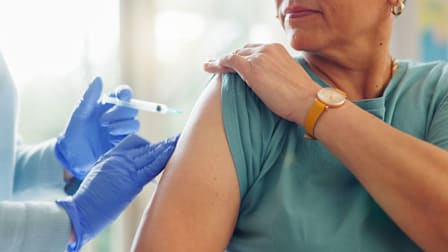The Booster Shots You Need As an Adult
Give your body a refresher course in fighting infection

These days, given the push for all eligible people to get a COVID-19 booster, you’re likely to have booster shots on the brain. But the SARS-CoV-2 virus is not the only infection for which a booster vaccine is helpful.
For illnesses such as the measles, the safeguards of the vaccines we got in childhood last a lifetime. But for certain other vaccines, the strength and length of protection varies. That’s because your level of antibodies—proteins that set off actions to vanquish a given pathogen—can wane over time.
A booster refreshes the immune system’s memory about how to deal with a specific infection. With a booster, “You’re going to come in and remind the immune system to create more antibodies to get back up to the level of protection,” says Shital Patel, MD, assistant professor of medicine in the section of infectious diseases at Baylor College of Medicine in Houston. Here are four key boosters to get.
COVID-19
Why you need it: Periodic spikes in infection rates and the emergence of new variants can raise your likelihood of infection.
Tetanus
Why you need it: As a child you probably received some type of vaccine against tetanus, a bacterial disease that can cause severe complications, such as lockjaw, or can even be fatal. The “Td” vaccine, for adults, is a booster for tetanus and diphtheria, a serious (although, in the U.S. today, mostly unheard of) nose and throat infection.
When to get it: Every 10 years. If you don’t remember when you last received it, ask your doctor’s office whether it has records of your previous booster. If no record is available, Patel says it’s safe to go ahead and get the booster.
Keep in mind: A tetanus booster is also indicated any time you’ve had a severe or dirty wound or burn—if it has been more than five years since your last booster.
Pertussis
Why you need it: Pertussis, or whooping cough, isn’t a major health threat to adults. But it can be extremely serious in infants, and adults can spread it to babies who haven’t received the vaccines yet. (They get their first pertussis shot at 2 months.) A dose of the “Tdap” vaccine is advisable before you interact with an infant, says Laura Haynes, PhD, professor of immunology at the UConn Center on Aging in Farmington, Conn.
When to get it: If you’ve never had a dose of Tdap, as soon as possible.
Keep in mind: Tdap contains the tetanus and diphtheria vaccines, too, so you can also use this as one of your every-10-years tetanus booster shots.
Shingles
Why you need it: The varicella-zoster virus remains in your body for life after you have chickenpox. Your immune system keeps it in check, but the infection can flare up again when your immune system is compromised by factors such as stress, Haynes says. When that happens, it causes shingles, a painful rash that can lead to long-term nerve pain. The vaccine Shingrix significantly reduces this risk.
When to get it: Any time after age 50, if you haven’t had Shingrix yet. The vaccine consists of two doses given between two and six months apart.
Keep in mind: The shingles vaccine isn’t commonly referred to as a booster, but it really does count as one because it reminds your body how to fight the varicella-zoster virus. Get the Shingrix vaccine even if you had the earlier version of the shingles vaccine (Zostavax), and even if you’ve already had shingles or you don’t remember whether you had chickenpox as a child.
Editor’s Note: A version of this article also appeared in the April 2022 issue of Consumer Reports On Health.




